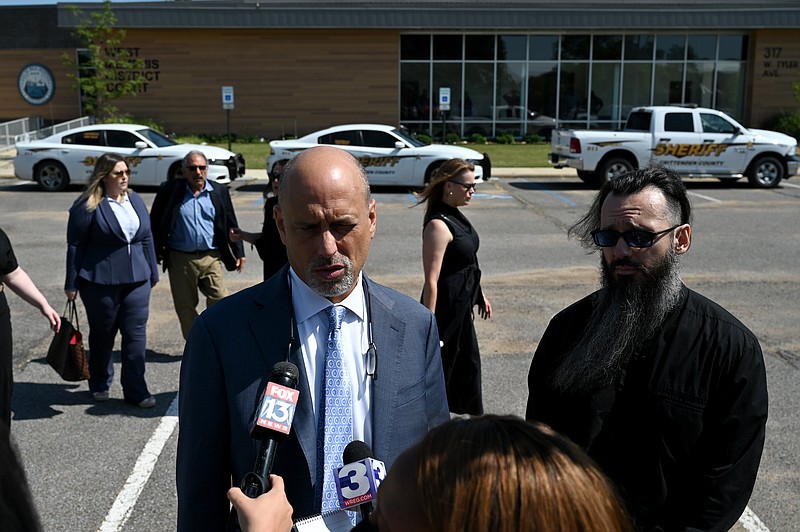If the Arkansas Supreme Court grants the state's motion to dismiss an appeal for new DNA testing in the West Memphis Three case, the request will be filed again in a different county, attorneys for Damien Echols wrote in an Arkansas Supreme Court filing on Wednesday.
"Granting of the State's motion effects nothing but delay into the processing of Echols' petition," according to his attorneys.
Citing a boxing maneuver meant to tire out opponents, they wrote, "The Court should decline to endorse this 'rope-a-dope' strategy by the State."
The issue involves jurisdiction.
Echols, along with Jason Baldwin and Jessie Misskelley, were convicted in 1994 of the slayings of three 8-year-old boys -- Christopher Byers, Steve Branch and Michael Moore -- whose bodies were found in a drainage ditch near West Memphis the previous year. Echols was sentenced to death.
The homicides occurred in Crittenden County, but Echols received a change of venue to Craighead County, where he was tried and convicted.
No DNA evidence ever linked the three to the deaths, and they were released from prison in 2011 after prosecutors allowed them to walk free as part of a deal known as an Alford Plea, which was also entered in Craighead County Circuit Court.
An Alford plea is a guilty plea in criminal court. By taking an Alford plea, a defendant does not admit to the criminal act and asserts their innocence, but agrees that the evidence presented by the prosecution would be likely to persuade a judge or jury to find the defendant guilty beyond a reasonable doubt.
Since then, the defendants have been trying to clear their names.
Attorneys representing Echols petitioned Crittenden County Circuit Court on Jan. 24, 2022, to permit new M-Vac wet-vacuum DNA testing on sneaker laces that were used to hogtie the three boys. This type of DNA testing wasn't available when previous DNA tests were done on evidence from the crime scene, according to the court filing.
Crittenden County Circuit Judge Tonya Alexander denied Echols' request in June, stating that he wasn't entitled to the evidence examination, even if it could clear him, because the law only allows incarcerated convicts the opportunity to seek new evidence testing.
Echols appealed the decision to the Arkansas Supreme Court.
On Feb. 21, Assistant Attorney General Brooke Jackson Gasaway filed a motion saying Echols' appeal should be dismissed because he filed his initial request in the wrong county.
"Echols is appealing the Crittenden County Circuit Court's denial of his petition for a writ of habeas corpus under Act 1780 of 2001," wrote Gasaway. "His conviction, however, was entered in the Craighead County Circuit Court in case number CR-93-540A.
"Under Ark. Code Ann. § 16-112-201(a) (Repl. 2016), an Act 1780 habeas petition must be filed in the circuit court where the judgment of 'conviction was entered.' Because Echols filed his petition in the wrong county, this court should dismiss for lack of jurisdiction."
But that's irrelevant because both Crittenden and Craighead counties are in Arkansas' 2nd Judicial Circuit, according to Wednesday's filing from Echols' attorneys -- John R. Elrod of Fayetteville, Patrick J. Benca of Little Rock and Stephen L. Braga of Washington, D.C.
They cite a 2020 case, Williams v. State, in which the Arkansas Supreme Court confronted a situation where a defendant "alleged that a jurisdictional violation occurred because he entered his plea in Desha County and not in Chicot County, where the crime was committed and the judgment was entered." Desha and Chicot counties are both in Arkansas' 10th Judicial Circuit.
The Supreme Court found that this "present[ed] issues of local jurisdiction," rather than "subject matter jurisdiction," according to Echols' filing. Circuit judges have "the authority to preside over proceedings in any courtroom, in any county, within the judicial district for which that judge was elected."
The parties can't waive a court's lack of subject-matter jurisdiction, according to Echols' attorneys.
They note that Prosecuting Attorney Keith L. Chrestman agreed to waive venue for the purpose of the circuit court hearing before Judge Alexander in Crittenden County in June.
"[V]enue and jurisdiction, though sometimes used interchangeably, are two distinct legal concepts," Echols' attorneys wrote, citing a 1994 case, Davis v. Reed. "Venue is the geographic area, like a county, where an action is brought to trial. Jurisdiction is the power of a court to decide cases and presupposes the control over the subject matter and parties."

